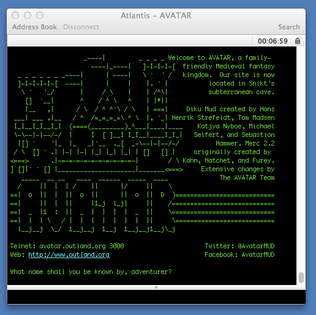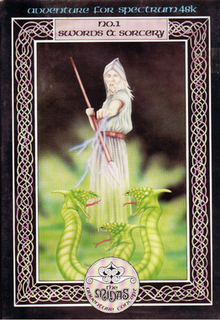A MUD is a multiplayer real-time virtual world, usually text-based. MUDs combine elements of role-playing games, hack and slash, player versus player, interactive fiction, and online chat. Players can read or view descriptions of rooms, objects, other players, non-player characters, and actions performed in the virtual world. Players typically interact with each other and the world by typing commands that resemble a natural language.
AberMUD was the first popular open source MUD. It was named after the town Aberystwyth, in which it was written. The first version was written in B by Alan Cox, Richard Acott, Jim Finnis, and Leon Thrane based at University of Wales, Aberystwyth for an old Honeywell mainframe and opened in 1987.
DikuMUD is a multiplayer text-based role-playing game, which is a type of multi-user domain (MUD). It was written in 1990 and 1991 by Sebastian Hammer, Tom Madsen, Katja Nyboe, Michael Seifert, and Hans Henrik Stærfeldt at DIKU —the department of computer science at the University of Copenhagen in Copenhagen, Denmark.

Online creation, also referred to as OLC, online coding, online building, and online editing, is a software feature of MUDs that allows users to edit a virtual world from within the game itself. In the absence of online creation, content is created in a text editor or level editor, and the program generally requires a restart in order to implement the changes.

Ancient Anguish, abbreviated AA, is a fantasy-themed MUD, a text-based online role-playing game. Founded in 1991 by Balz "Zor" Meierhans and Olivier "Drake" Maquelin, it opened to the public on February 2, 1992. It is free-to-play, but has been supported by player donations since 1994.
A MUD client is a computer application used to connect to a MUD, a type of multiplayer online game. Generally, a MUD client is a very basic telnet client that lacks VT100 terminal emulation and the capability to perform telnet negotiations. On the other hand, MUD clients are enhanced with various features designed to enhance the gameplay of MUDs.
LPMud, abbreviated LP, is a family of MUD server software. Its first instance, the original LPMud game driver, was developed in 1989 by Lars Pensjö. LPMud was innovative in its separation of the MUD infrastructure into a virtual machine and a development framework written in the LPC programming language.
A mob, short for mobile, is a computer-controlled non-player character (NPC) in a computer game such as an MMORPG or MUD. Depending on context, every and any such characters in a game may be considered to be a "mob", or usage of the term may be limited to hostile NPCs and/or NPCs vulnerable to attack.

Armageddon, frequently abbreviated Arm, is a low fantasy MUD – a text-based online role-playing game – set in a desert world called Zalanthas. It was founded in 1991 by Dan Brumleve, Nasri Hajj, and Santiago Zorzopulos in Urbana, Illinois. It requires its players to focus on role-playing.
Sequent was a DikuMUD derivative codebase developed by Raja Kushalnagar. It was a text-based online role-playing game that was an accessible DikuMUD based MUD. It added several new playing areas with shorter text descriptions that was designed to be accessible to users with sensory disabilities. It also supported more players online at the same time by being hosted on a Sequent multi-processor machine at the University of California, Berkeley, and was first started in March 1991.
TinyFugue, or tf, is a MUD client, primarily written for Unix-like operating systems. It is one of the earliest MUD clients in existence. It is a successor to the earliest MUD client, TinyTalk, through a never-officially-released improved version called TinyWar. It was developed by Ken Keys until 2008. Like the name suggests, it is primarily geared toward TinyMUD variants, but can easily be used or adapted for most other MUD types.

GodWars is a family of MUD engines derived from Merc, created in 1995 by Richard Woolcock, also known as "KaVir". GodWars' setting is influenced by White Wolf's World of Darkness.

The Mud Connector, abbreviated TMC, is a computer gaming website that provides articles, discussions, reviews, resource links and game listings about MUDs. The site lets MUD owners, administrators and enthusiasts submit information and reviews about specific MUDs. The site contains over 1000 MUD listings and designates a subset of virtual communities suitable for children. Mud Companion magazine praised the site.

LegendMUD is a text-only MUD game founded by a group of friends including virtual world designer Raph Koster. It features historically significant story elements and award-winning gameplay. It opened publicly on February 14, 1994. It has received critical praise for its research and attention to detail in reconstructing past cultures within the game context.

Lost Souls is a MUD, a text-based online role-playing game set in a medieval fantasy world. It has an extensive history of technical innovation in its field and has received critical praise.
Genocide is a MUD, a text-based online game, focused exclusively on player-killing. Founded in 1992, it was influential as the first such "pure PK" MUD, and has met with positive critical response.
Rent, in MUDs, is a mechanism for both enabling and limiting persistence of a player character's possessions. In the "traditional" rent paradigm, in order to keep belongings between game sessions, the player must travel to an inn and use the rent command there, and is assessed a price, in game money, for each inventory item; items that cannot be paid for are not persisted. If the player simply uses the quit command rather than rent, inventory items are not kept, and fall to the ground. Many evolutions of this approach exist: the rent command is often made to be performable anywhere rather than only at an inn, sometimes costs are removed or made negligible, and so on. At times, in MUDs where inventory is made to simply persist automatically when the player quits the game, the conceptualization of inventory persistence as "rent" is sufficiently ingrained that this is referred to as "autorent".
Northern Lights, abbreviated NL, is a MUD, a text-based online role-playing game, founded in 1992 by Anna "Vitastjern" Eklund. It has at times been noted as a particularly large and popular example of its type, and has received critical praise.

A.V.A.T.A.R. MUD is a free, online, massively multiplayer, fantasy, text-based role-playing game, set in a real-time virtual environment. It combines elements of role-playing games, hack and slash style computer games, adventure games and social gaming.

Swords and Sorcery is a fantasy role playing video game developed and published by Personal Software Services. It was released exclusively in the United Kingdom for the ZX Spectrum in 1985 and the Amstrad CPC in 1986. The game contains elements of dungeon crawling and revolves around a customisable player-character navigating through catacombs in order to secure a large wealth of treasure, whilst simultaneously collecting seven pieces of sacred armour.







